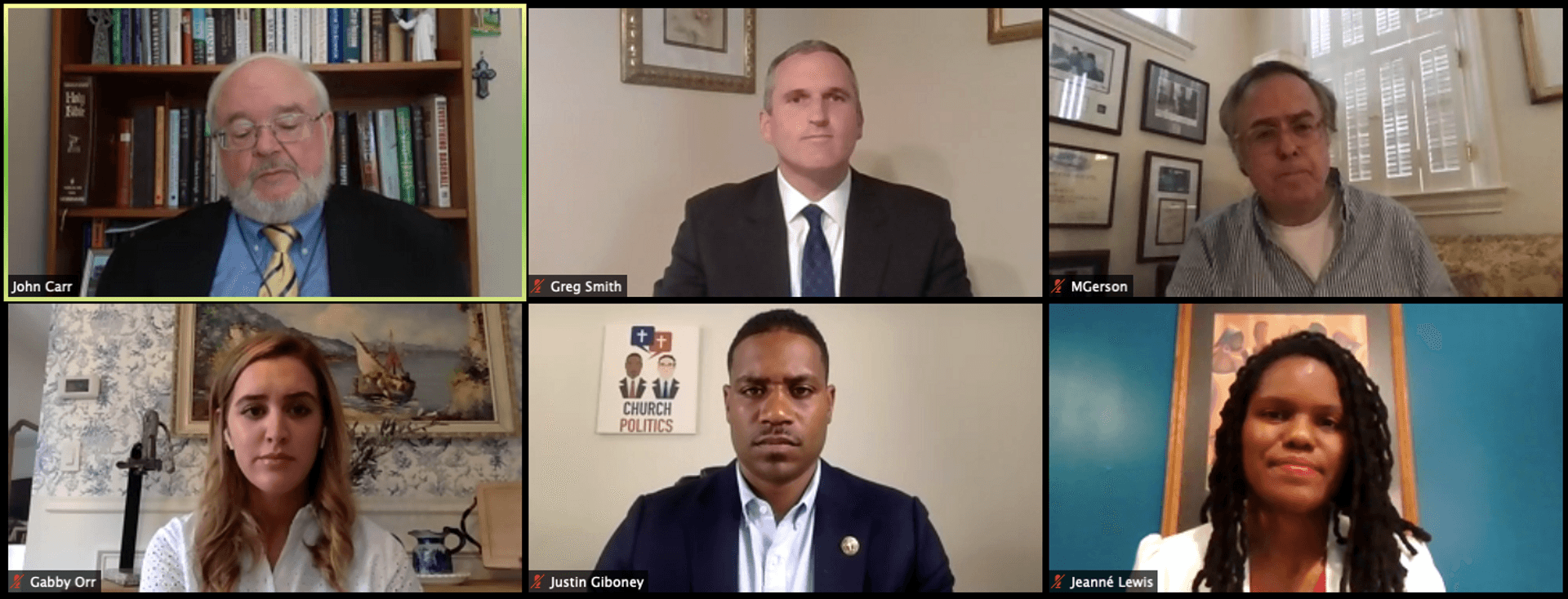With Americans reassessing how race matters in their society, race’s role at the volatile intersection of religion and politics is also coming increasingly under the microscope.
Gregory Smith, associate director of research at Pew Research Center, argued Friday that popular narratives about the “God gap” in American politics – the idea that the more religiously observant you are, the more likely you are to vote Republican – fail to account for race.
The God gap, Smith said, does speak to a real phenomenon among white Americans, where “it’s true that deeply religious white people tend to be much more Republican, much more politically conservative than white people who are not particularly religious.”
When it comes to the country’s other racial and ethnic communities, however, “that God gap simply doesn’t exist.” Instead, he said, “most of them are both deeply religious and strongly Democratic.”
This reality was on display in Pew’s recent polling data, which calculated that 88 percent of Black Protestant registered voters would vote for or are leaning towards voting for Joe Biden, whereas only 17 percent of white evangelicals and 37 percent of white mainline Protestants fell into that same camp.
Smith’s efforts to clarify the God gap came during the “Faith and the Faithful in the 2020 Elections: Religion, Racism, and the COVID-19 Crisis” online dialogue, hosted July 10 by Georgetown University’s Initiative on Catholic Social Thought and Public Life.
The Pew researcher also highlighted a recent trend away from President Donald Trump among white Catholics and white evangelicals, noting that approval ratings for the incumbent is down 8 percent among the former and 6 percent for the latter since they were polled in April.
At the same time, he cautioned that April was a “high water mark” for Trump among those groups, so while the declines are real, their significance should not be exaggerated.
Even with the recent declines, 54 percent of white Catholics and 72 percent of white evangelical Protestants approved of Donald Trump’s job performance when polled in June. Approval ratings among Black Protestants dropped from 21 percent to 12 percent from April to June.
Justin Giboney, president and co-founder of the AND Campaign – a Christian organization dedicated to educating and organizing Christians for civic and cultural engagement – picked up on different angles into race, religion, and politics that he argued expose the “insufficiency of the standard conservative and standard progressive positions.”
Regarding the Democratic Party that elected him as a delegate for the Democratic National Convention in both 2012 and 2016, Giboney said that he fears a “miscarriage of democracy” is now taking place: “Someone has to answer the question for me… how is it that not one nationally known black or brown democrat is pro-life, when many of their constituents are?”
Referencing his experience of “far-left” leaders attempting to have him removed from the party delegation in 2016 after he referenced his pro-life commitments and concerns for religious freedom in his acceptance speech, Giboney spoke of an “illiberalism growing in the Democratic Party” that “wants the votes of black and brown Christians, but wants to silence our values, it seems.”
On the other hand, he said, “The political right’s anemic position on racial issues, I think, has become obvious and embarrassing to a lot of Republicans and hopefully to a lot of evangelicals, and that should have been the case a long time ago.”
“The way Republicans have allowed President Trump to destructively manipulate race issues has just been shameful,” Giboney continued, “and I think they’ll be dealing with the loss of integrity and credibility for some time.”
Given these problems in America’s two major political camps, Giboney said that it’s not a bad thing that many Christians are struggling to feel at home in either party.
Now is the time to “disentangle from partisanship” and put pressure on one’s own political party to ensure that the false dichotomy between “social justice and moral order” does not continue, he argued.
Jeanné Lewis, a board member of Faith in Public Life and candidate for the Washington, DC, City Council, agreed that this false dichotomy is a problem and added that now is the time for a “more sophisticated analysis of what it means that life is sacred from conception to death… what it means to say that people have a fair opportunity to work hard and gain economic stability for themselves and for their families, and how all of these issues intersect.”
Looking ahead to November, moderator John Carr concluded that the nation is facing an “enormous test of who we are and what we believe.” Calling it a test of faith, hope, and love, he asked, “What do we believe, what are we going to become, and are we going to demonstrate our love for all God’s children?”













